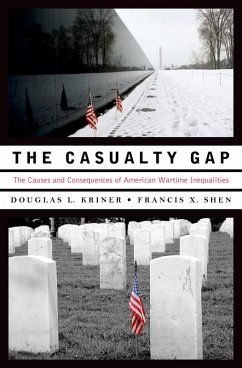The Casualty Gap shows how the most important cost of American military campaigns--the loss of human life--has been paid disproportionately by poorer and less-educated communities since the 1950s. Drawing on a rich array of evidence, including National Archives data on the hometowns of more than 400,000 American soldiers killed in World War II, Korea, Vietnam, and Iraq, this book is the most ambitious inquiry to date into the distribution of American wartime casualties across the nation, the forces causing such inequalities to emerge, and their consequences for politics and democratic governance.
Dieser Download kann aus rechtlichen Gründen nur mit Rechnungsadresse in A, B, BG, CY, CZ, D, DK, EW, E, FIN, F, GR, HR, H, IRL, I, LT, L, LR, M, NL, PL, P, R, S, SLO, SK ausgeliefert werden.

